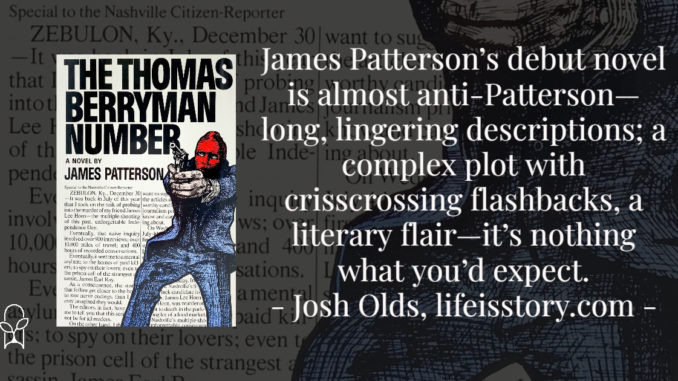
Also by this author: 1st to Die, 2nd Chance, 3rd Degree, The Horsewoman, 4th of July, The 5th Horseman, The 6th Target, 7th Heaven, The 8th Confession, The 9th Judgment
on March 31, 1976
Genres: Fiction, Speculative, Thriller
Buy on Amazon
Goodreads

The most terrifyingly efficient hit man alive stalks his biggest prize yet--the country's leading African-American citizen, the mayor of Nashville. In a desperate race against time, one Southern reporter must dog him across six states to get the story of a lifetime and stop a July 4th assassination of a beloved American leader.
It is shocking how un-James Patterson-esque The Thomas Berryman Number is. James Patterson’s debut novel is almost anti-Patterson—long, lingering descriptions; a complex plot with crisscrossing flashbacks, a literary flair—it’s nothing what you’d expect. And this is purposeful. The Thomas Berryman Number won an Edgar award but didn’t do so well commercially. Patterson listened to the critics, changed his writing style, and while he’s never going to win another literary award, I’m sure he finds solace in his hundreds of millions of dollars.
It is hilarious how Patterson, known for his sparse approach to narrative, takes his time with every scene, providing readers with a slow-paced, incredibly detailed thriller. A contemporary review from the New York Times called it “topheavy with detail,” writing that Patterson “lays on the specifics of an assassination plot with an impasto of minutiae.”
The assassination plot itself is directed toward Senate hopeful Jimmie Lee Horn, the first Black mayor of Nashville. Journalist Ochs Jones suspects that racism and prejudice had something to do with it, and he’s soon able to link the case to two other murders. Patterson shifts perspectives and timeframes in a way that makes the book more complicated than necessary and takes away some of the drama. Jones’s perspective comes across in the narrative and as actual newspaper entries. We also get scenes straight from Thomas Berryman, the titular hitman’s, perspective.
Frankly, I don’t know why this won an Edgar Award. Patterson’s complicated structure gives it the illusion of literariness without there actually being much substance. His descriptiveness is fully-realized but often doesn’t matter much or drive the story forward. The Thomas Berryman Number is a slow, occasionally uninteresting novel that has its flashes of brilliance. I would love to see Patterson go back and rewrite the story in his current style and see how it looks. This is one of Patterson’s lowest rated books on Goodreads, standing at a 2.83 with 5,593 ratings. It’s easy to see why. Not only is not what we’ve come to expect from Patterson, it isn’t even particularly good in its own right—and honestly, given how far Patterson has distanced himself from The Thomas Berryman Number, I think he’d agree.

